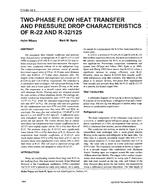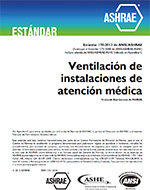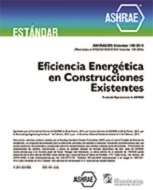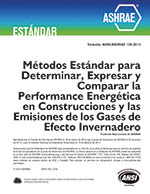Description
The two-phase heat transfer coefficient and pressure drop characteristics of refrigerants R22, and R32/125 (ASI 1990)(a mixture of 50 wt% R32 and 50 wt% R125 that exhibits azeotropic behaviour) have been measured. The experiments were conducted without oil in the refrigerant loop. The condenser/evaporator test sections consist of smooth, horizontal copper tubes of 3/8-in. (9.53-mm) outer diameter (OD) and 0.305-in. (7.75-mm) inner diameter (ID). The lengths of the condenser and evaporator test sections are 10 ft (3.05 m) and 12 ft (3.66 m), respectively. The condenser is a counterflow heat exchanger with refrigerant flowing in the inner tube and a water-glycol mixture flowing in the annulus. The evaporator is a smooth copper tube sandwiched with aluminium blocks. Heating tapes are wrapped around the outer surface of these aluminium blocks. The average saturated condensing temperatures were 115degF (46.1degC) and 125degF (51.7degC), while the saturated evaporating temperature was 40degF (4.4degC). The average inlet and exit qualities for the condensation tests were 87% and 25%, respectively, and for the evaporation tests they were 20% and 90%, respectively. The mass flux was varied from 118klb/ft2.h (160kg/s.m2) to 414klb/ft2.h (561kg/s.m2). A differential pressure transducer was used to measure the pressure drop across the test section. The results showed that at similar mass fluxes the condensation heat transfer coefficients for R32/125 were slightly higher (about 2% to 6%) than those of R22. The pressure drop for R32/125 were significantly lower (about 25% to 45%) than those of R22. However, the evaporation heat transfer coefficients of R32/125 were much higher (about 23% to 63%), and its pressure drops were significantly lower (about 20% to 38%) than those of R22. This will lead to improved energy efficiency when systems are designed to utilise R32/125.
KEYWORDS: year 1995, refrigerants, R22, R32, R125 mixtures, heat flow, heat transfer coefficient, pressure drop, properties, azeotropic, measuring, experiment, replacing, counter flow heat exchangers, heat exchangers, comparing
Citation: Symposium, ASHRAE Trans. 1995, Vol.101, Part 1, Paper number CH-95-1-1, 525-527
Product Details
- Published:
- 1995
- File Size:
- 1 file , 760 KB
- Product Code(s):
- D-17221




